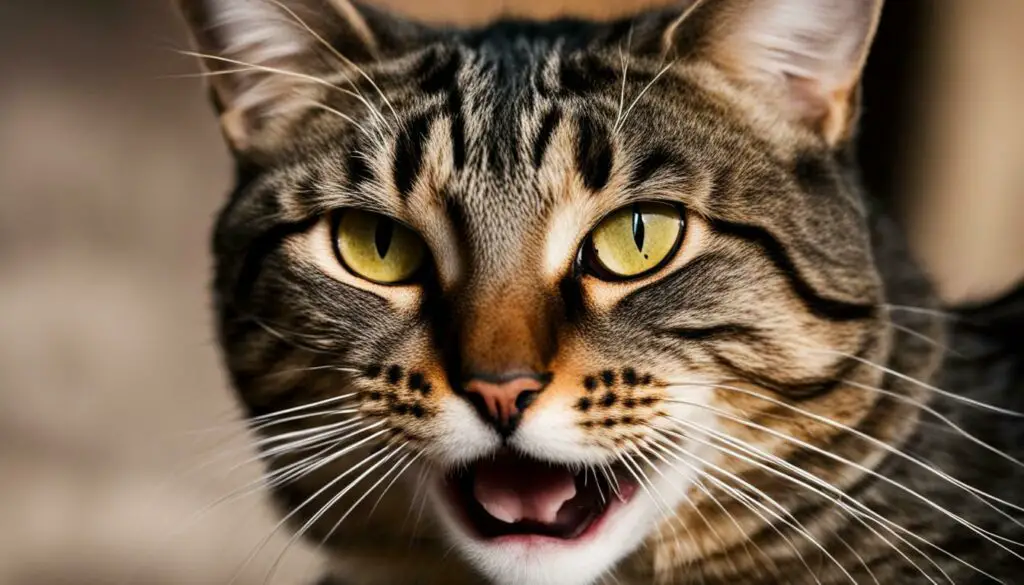Have you noticed that your cat’s meow is weak and raspy? You’re not alone. Many cat owners have turned to Reddit to seek advice on this peculiar issue. In this section, we will explore the common issue of a weak and raspy meow in cats by sharing insights from the Reddit cat community. Discover why this topic has become popular among cat owners and gain valuable advice from others who have experienced the same with their beloved feline friends.
Key Takeaways:
- A weak and raspy meow in cats can be a sign of a serious medical issue
- Common causes include upper respiratory infections, overuse of vocal cords, polyps, trapped foreign bodies, hyperthyroidism, and laryngeal nerve paralysis
- Seek veterinary care if you notice changes in your cat’s meow, along with other symptoms
- Prompt treatment is crucial for your cat’s well-being and recovery
- Join the Reddit cat community to share experiences and gain insights from fellow cat owners
Understanding Cat Vocalization and Communication
Cats use vocalization to communicate with their owners and other animals. Understanding their meows can help us identify any changes in their vocal behavior. Cats have a wide range of sounds they use to express their needs, emotions, and desires. From the familiar “meow” to chirps, purrs, hisses, and growls, each sound carries a specific meaning.
When your cat meows, they may be trying to get your attention, seeking food or water, expressing discomfort or pain, or simply saying hello. By paying attention to the context and tone of their meow, as well as their body language, we can better understand what they are trying to convey.
It’s important to note that each cat is unique in their vocalization habits. Some cats are naturally more chatty, while others are quieter. Changes in vocal behavior, such as a weak or raspy meow, should be taken seriously as it could indicate an underlying health issue.

If you notice that your cat’s meow has become weak or raspy, it’s crucial to consult a veterinarian for an accurate diagnosis. They can assess your cat’s overall health and determine the cause of the change in vocalization. Early detection and treatment of any underlying conditions can help ensure your cat’s well-being and provide them with the necessary care for a full recovery.
Common Causes of a Weak and Raspy Meow
It’s crucial to identify the potential health issues that can lead to a weak and raspy meow in cats. Let’s explore some of the common causes.
1. Upper Respiratory Infections: Cats can develop upper respiratory infections, such as feline viral rhinotracheitis or calicivirus, which can cause inflammation and congestion in the nasal passages. This can result in a weak and raspy meow. Other symptoms may include sneezing, coughing, and discharge from the eyes or nose. Prompt veterinary care is essential to treat these infections effectively.
2. Overuse of Vocal Cords: Cats may strain their vocal cords by excessive meowing or using their voice in stressful situations. This strain can lead to a weak and raspy meow. It’s important to provide your cat with a calm and stress-free environment, and to discourage excessive vocalization.
3. Nasopharyngeal Polyps and Trapped Foreign Bodies: Nasopharyngeal polyps are benign growths that can obstruct a cat’s airways and affect their meow. Additionally, foreign objects lodged in the throat can cause irritation and alter vocalization. If you suspect your cat has a polyp or foreign body, consult a veterinarian for proper diagnosis and treatment.
4. Hyperthyroidism: Hyperthyroidism is a common hormonal disorder in cats and can impact their meowing. An overactive thyroid gland can lead to changes in vocalization patterns, including a weak and raspy meow. Your vet can perform tests to confirm this condition and recommend appropriate treatment.
| Possible Causes of Weak and Raspy Meow | Symptoms | Treatment |
|---|---|---|
| Upper Respiratory Infections | Sneezing, coughing, discharge from eyes or nose | Antibiotics, supportive care |
| Overuse of Vocal Cords | Stressful situations, excessive meowing | Provide a calm environment, discourage excessive vocalization |
| Nasopharyngeal Polyps and Trapped Foreign Bodies | Obstructed airways, irritation | Surgical removal, medication |
| Hyperthyroidism | Weight loss, increased appetite, restlessness | Medication, dietary changes, radioactive iodine treatment |
Remember, if your cat’s meow is weak and raspy, it’s important to consult a veterinarian for an accurate diagnosis and appropriate treatment. Early intervention can make a significant difference in your cat’s well-being and recovery.
By understanding the common causes of a weak and raspy meow in cats, you can better advocate for your feline friend’s health. Keep an eye out for any changes in vocalization and seek professional care if needed. With proper diagnosis and treatment, your cat will be on the path to regaining their strong and clear meow.
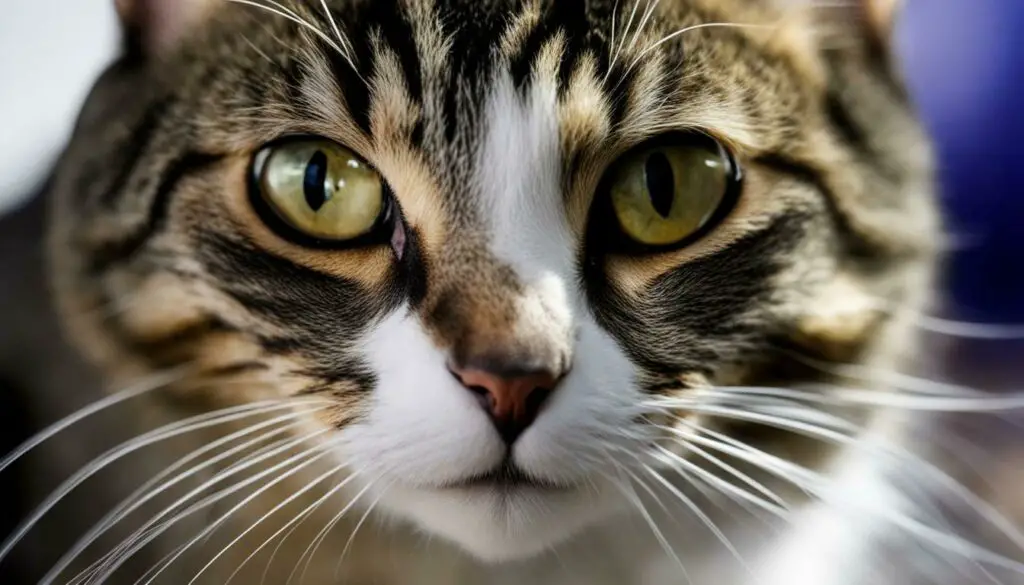
Upper Respiratory Infections in Cats
Upper respiratory infections are a common cause of a weak and raspy meow in cats, often accompanied by other noticeable symptoms. These infections, such as feline viral rhinotracheitis or calicivirus, can cause inflammation and nasal congestion, which directly affect a cat’s ability to produce a strong meow. In addition to a weak meow, you may also observe symptoms such as sneezing, coughing, runny nose, and watery eyes.
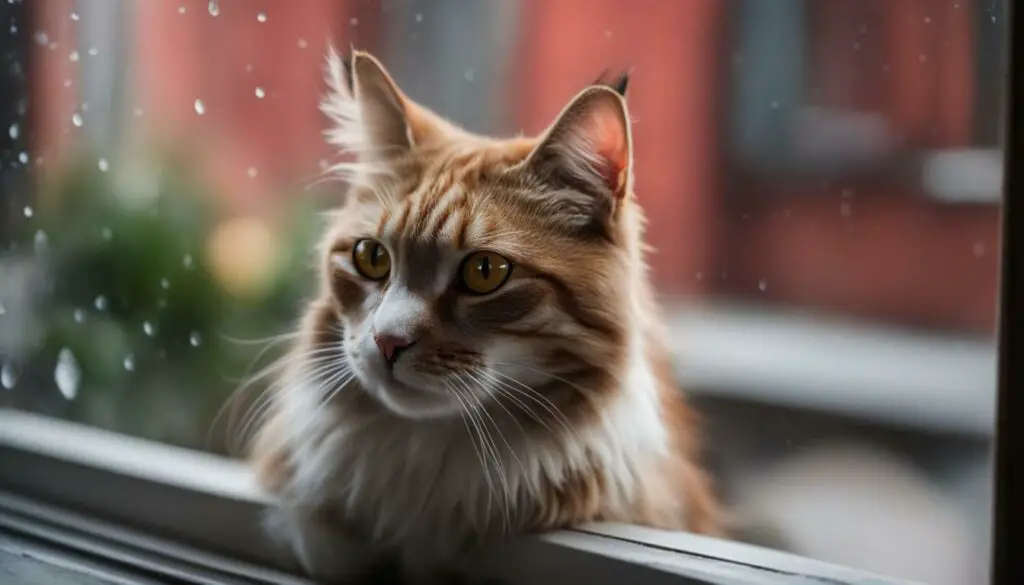
To diagnose and treat upper respiratory infections, it is crucial to consult a veterinarian. They will conduct a thorough examination of your cat, which may include checking their throat, lungs, and nasal passages. Depending on the severity of the infection, treatment options may range from supportive care, such as humidifiers and saline nasal drops, to antiviral medications or antibiotics.
Preventive Measures
- Keeping your cat’s living environment clean and free from potential sources of infection is essential in preventing upper respiratory infections.
- Ensure your cat is up to date on vaccinations, as certain vaccines can provide protection against common respiratory viruses.
- Reduce stress in your cat’s life, as stress can weaken their immune system and make them more susceptible to infections. Provide a calm and comfortable environment for your cat.
Avoid exposing your cat to other sick cats or animals with respiratory symptoms. If you have multiple cats, it is crucial to isolate any infected individuals to prevent the infection from spreading.
| Signs of Upper Respiratory Infections in Cats | Treatment Options |
|---|---|
| Sneezing | Supportive care (e.g., humidifiers, saline nasal drops) |
| Coughing | Antiviral medications |
| Runny nose | Antibiotics |
| Watery eyes |
“Upper respiratory infections can be quite uncomfortable for cats, causing them to lose their appetite and energy. It’s important to seek veterinary care as soon as possible and follow the prescribed treatment plan to help your cat recover.”
Overuse of Vocal Cords
Just like humans, cats can experience strain in their vocal cords from overusing their voice, resulting in a weak and raspy meow. This can occur when cats excessively meow or use their voice in stressful situations. While occasional meowing is normal, excessive vocalization can lead to fatigue and strain on the vocal cords.
To help your cat recover from vocal cord strain, it’s important to provide them with a quiet and calm environment. Limiting their exposure to stressful situations can prevent further strain on their vocal cords. Additionally, reducing environmental stressors and ensuring they have a comfortable space to rest can aid in their recovery.
If you notice that your cat is meowing excessively, try to identify the underlying cause. Cats may meow more when they are hungry, bored, or seeking attention. By addressing these needs, you can help prevent them from overusing their voice.
1. Provide a quiet and calm environment for your cat to rest and recover.
2. Minimize exposure to stressful situations or loud noises.
3. Address any underlying needs that may be causing excessive meowing, such as hunger or boredom.
4. Offer comforting activities, such as gentle play or brushing, to help reduce stress and promote relaxation.
Remember, if your cat’s weak and raspy meow persists or is accompanied by other concerning symptoms, it’s important to seek veterinary care. A veterinarian can provide a thorough examination to determine the underlying cause of the meowing and recommend appropriate treatment options.

Nasopharyngeal Polyps and Trapped Foreign Bodies: Causes of a Weak and Raspy Meow
Nasopharyngeal polyps and trapped foreign bodies can cause disruptions in a cat’s vocalization, resulting in a weak and raspy meow. These conditions can occur when abnormal growths or foreign objects obstruct the airways, affecting the cat’s ability to produce clear and normal meowing sounds. If your cat’s meow has become weaker or raspier, it’s crucial to consider these potential causes and seek veterinary care for a thorough evaluation.
Nasopharyngeal polyps are benign growths that can develop in the nasal cavity or throat of cats. These growths can block the air passages, leading to changes in the cat’s vocalization. Similarly, foreign bodies lodged in the throat can irritate and interfere with the vocal cords, causing alterations in the meow sound.
Identifying nasopharyngeal polyps or trapped foreign bodies requires professional examination by a veterinarian. The vet may conduct a physical examination, take X-rays, or perform an endoscopy to visualize the airways and determine the presence of any anomalies. Once diagnosed, appropriate treatment options can be discussed.
Treatment Options for Nasopharyngeal Polyps and Trapped Foreign Bodies
The treatment for nasopharyngeal polyps typically involves surgical removal. This procedure aims to eliminate the growths and clear the obstruction in the airways, allowing for normal vocalization. In some cases, multiple procedures may be required if the polyps recur.
If a foreign body is present, the vet may use various methods to remove it, including gentle manipulation or endoscopic retrieval. The specific approach will depend on the size and location of the foreign object. In some instances, surgery may be necessary to extract the foreign body safely.
Following the removal of nasopharyngeal polyps or foreign bodies, cats usually experience improvement in their meow sounds. However, it’s essential to provide post-operative care as advised by your veterinarian to ensure a smooth recovery and minimize the risk of complications.
| Causes of Weak and Raspy Meow | Key Points |
|---|---|
| Nasopharyngeal Polyps | Benign growths that obstruct the airways and affect vocalization |
| Trapped Foreign Bodies | Objects stuck in the throat can cause irritation and alter meow sound |
Hyperthyroidism and its Impact on Meowing
Hyperthyroidism, a condition affecting the thyroid gland, can have an impact on a cat’s meowing abilities. The thyroid gland, located in the neck, plays a crucial role in regulating the body’s metabolism. When this gland becomes overactive, it produces an excess amount of thyroid hormones, leading to a range of symptoms, including changes in vocalization.
Cats with hyperthyroidism may experience an increase in the volume of their meow, or their meow may become more high-pitched and strained. Some cats may even develop a weak and raspy meow. This change in vocalization can be attributed to the underlying hormonal imbalance caused by hyperthyroidism.
If you suspect that your cat’s meow has changed and they exhibit other symptoms such as weight loss, increased appetite, restlessness, or vomiting, it’s crucial to consult a veterinarian for a proper diagnosis. Your vet will be able to perform blood tests to measure the levels of thyroid hormones and determine if hyperthyroidism is the cause.
Treatment options for hyperthyroidism in cats include medication, surgery, or radioactive iodine therapy. The appropriate treatment will depend on your cat’s age, overall health, and the severity of the condition. With proper management and treatment, your cat’s meow may return to normal once their thyroid levels are regulated.

| Signs of Hyperthyroidism in Cats | Treatment Options |
|---|---|
| Weight loss despite increased appetite | Medication to regulate thyroid hormone levels |
| Increased thirst and urination | Surgical removal of the thyroid gland |
| Restlessness and hyperactivity | Radioactive iodine therapy |
| Vomiting or diarrhea | Modified diet low in iodine |
“It’s important to monitor your cat’s behavior and seek veterinary care if you notice any changes in their meow. Hyperthyroidism can have serious implications for your cat’s overall health, and early intervention is key to ensuring a successful outcome.” – Dr. Sarah Johnson, Veterinarian
Laryngeal Nerve Paralysis and Meow Changes
Laryngeal nerve paralysis is a condition that can affect a cat’s meow, causing it to sound weak and raspy. This condition occurs when the nerves that control the muscles of the larynx, or voice box, are damaged or paralyzed. As a result, the vocal cords do not function properly, leading to changes in the cat’s meowing sound.
There are several potential causes of laryngeal nerve paralysis in cats. Trauma or injury to the neck, such as from a car accident or rough handling, can damage the nerves. In some cases, the cause may be idiopathic, meaning it is unknown. Additionally, certain medical conditions, such as cancer or thyroid disorders, can contribute to the development of laryngeal nerve paralysis.
If you suspect that your cat may be experiencing laryngeal nerve paralysis, it is important to seek veterinary care promptly. Your veterinarian will perform a thorough examination, which may include a laryngoscopy to visualize the larynx and assess the function of the vocal cords. Treatment options for laryngeal nerve paralysis can vary depending on the underlying cause and severity of the condition. In some cases, surgery may be necessary to restore function to the affected nerves.
If your cat is diagnosed with laryngeal nerve paralysis, your veterinarian will provide guidance on how to manage the condition and support your cat’s well-being. It may be necessary to make adjustments to your cat’s environment or feeding routine to ensure their comfort. Regular follow-up appointments with the veterinarian will be important to monitor the progression of the condition and make any necessary modifications to the treatment plan.

Seeking Veterinary Care and Diagnosis
It’s crucial to involve a veterinarian when your cat exhibits a weak and raspy meow, as they can provide an accurate diagnosis and recommend suitable treatment. A change in your cat’s meow could be a sign of an underlying health issue that requires medical attention. Bringing your cat to the vet allows for a thorough examination and identification of potential causes, ensuring prompt intervention for your feline friend’s well-being.
During the veterinary visit, the veterinarian will conduct a comprehensive physical examination of your cat, paying particular attention to their respiratory system, throat, and vocal cords. They may also recommend additional diagnostic tests, such as blood work, X-rays, or ultrasound, to further investigate any potential underlying health issues.
Based on the examination findings and test results, the veterinarian can determine the specific cause of your cat’s weak and raspy meow. Treatment options will depend on the diagnosed condition and may include medications, surgery, or other interventions to alleviate the underlying issue and restore your cat’s meowing abilities.
Remember, early intervention is essential to prevent the progression of any potential health problems. By seeking veterinary care and diagnosis, you are taking the first step towards ensuring your cat’s health and helping them regain their normal meowing voice.
| Tips for Seeking Veterinary Care and Diagnosis |
|---|
| 1. Act promptly: If you notice any changes in your cat’s meow, especially when accompanied by other concerning symptoms, don’t delay seeking veterinary care. Time is of the essence in diagnosing and treating potential health issues. |
| 2. Share observations: Provide the veterinarian with detailed information about your cat’s meowing pattern, when the changes started, and any other symptoms you’ve noticed. This will help the veterinarian make an accurate diagnosis. |
| 3. Be prepared: Bring any relevant medical records, including vaccination history and previous health concerns, to the veterinary appointment. The more information the veterinarian has, the better they can assess your cat’s overall health. |
| 4. Follow the recommended treatment plan: Once a diagnosis is made, the veterinarian will outline a treatment plan tailored to your cat’s specific needs. Follow their instructions diligently to ensure the best outcome for your furry companion. |
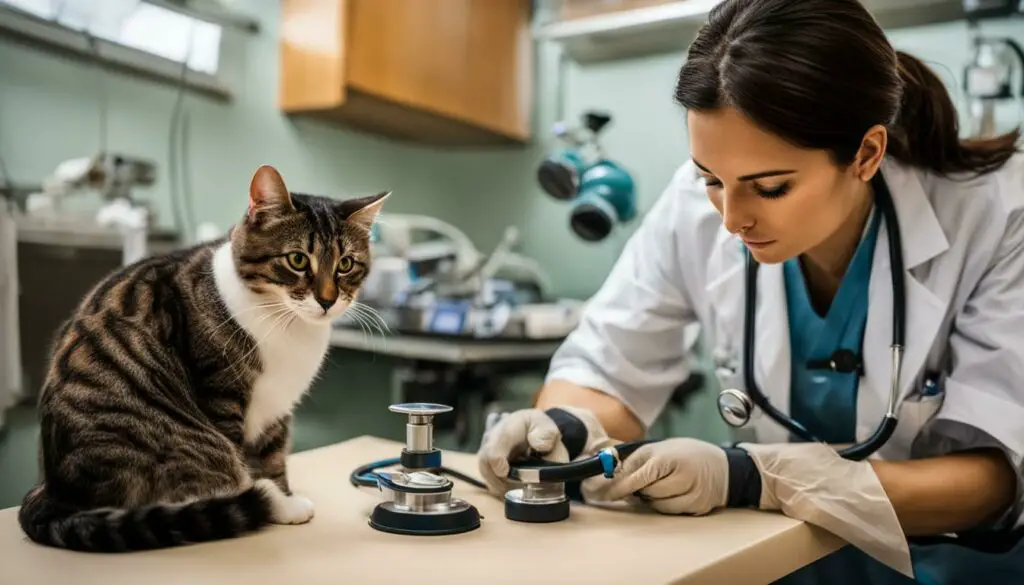
Home Care Tips for Cats with Weak Meows
Apart from professional veterinary care, there are some home care tips you can follow to help support your cat with a weak and raspy meow. Creating a comfortable and stress-free environment is essential for your furry friend’s recovery. Here are a few tips:
- Provide a quiet space: Cats with weak meows may benefit from a calm and quiet environment. Create a designated area where your cat can relax without excessive noise or disturbances. This will allow them to conserve their energy and focus on healing.
- Monitor their hydration: Ensure your cat has easy access to fresh water at all times. Consider using a fountain or providing multiple water sources to encourage them to stay hydrated. Proper hydration is crucial for their overall well-being and can help alleviate symptoms.
- Follow a balanced diet: Provide a well-balanced diet that meets your cat’s nutritional needs. Speak to your veterinarian about any dietary adjustments that may be necessary to support their health and recovery. Proper nutrition plays a vital role in strengthening their immune system.
- Manage stress levels: Stress can worsen symptoms and prolong recovery time. Create a calm and soothing environment by using pheromone diffusers, providing hiding spots, and engaging in interactive play sessions to help alleviate stress and anxiety.
To further assist your cat with a weak meow, it’s important to stay in close communication with your veterinarian. Regularly update them on any changes or progress you observe in your cat’s health. Remember, each cat is unique, and the treatment plan may vary. Always consult with a professional to determine the best course of action for your furry companion.
Table: Nutritional Tips for Cats with Weak Meows
Here’s a table summarizing key nutritional tips to support your cat’s recovery:
| Tip | Description |
|---|---|
| Provide high-quality proteins | Include sources such as chicken, fish, or eggs to support muscle maintenance and immune function. |
| Incorporate omega-3 fatty acids | These can be found in fish oil or supplements and help reduce inflammation. |
| Add moisture to the diet | Wet or canned food can help keep your cat hydrated and ease swallowing. |
| Offer smaller, frequent meals | Feeding smaller portions more frequently can aid digestion and prevent discomfort. |
Remember to consult your veterinarian for individualized dietary recommendations based on your cat’s specific needs and health condition.
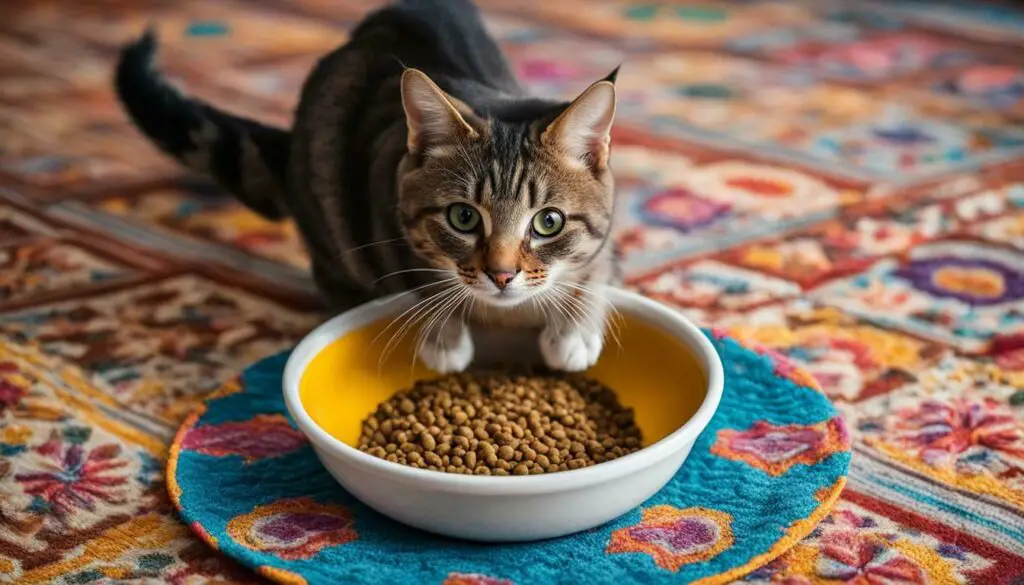
Sharing Experiences and Tips from Cat Owners
The Reddit cat community has been a valuable platform for cat owners to connect and share their experiences with weak and raspy meows. It’s comforting to know that you’re not alone in dealing with this issue and that others have gone through similar situations with their feline friends. By joining in on the discussion, you can gain insights, tips, and advice from fellow cat lovers who have faced the same challenges.
One cat owner on Reddit shared how their cat’s weak meow turned out to be a result of an upper respiratory infection. They emphasized the importance of seeking veterinary care, as prompt diagnosis and appropriate treatment helped their cat recover quickly. Another user mentioned that their cat’s raspy meow was due to overuse of their vocal cords during a period of stress. They found that creating a calm and peaceful environment, as well as giving their cat extra attention and reassurance, helped alleviate the strain on their vocal cords.
If you’re experiencing a weak or raspy meow in your cat, Reddit users also recommend seeking veterinary care to rule out any underlying health issues. Some suggested keeping a journal to track your cat’s meowing patterns, any accompanying symptoms, and the times when the meow is particularly weak or raspy. This information can be helpful for your vet in the diagnostic process.
| Tips from Cat Owners: |
|---|
|
Remember, while the experiences shared on Reddit can provide valuable insights, it’s essential to consult a vet for an accurate diagnosis and appropriate treatment for your cat. Each cat is unique, and what works for one may not work for another. With the support of the Reddit cat community and professional veterinary care, you can help your feline companion regain their vocal strength and lead a happy, healthy life.

Supporting Your Cat’s Well-being and Recovery
Ensuring your cat’s well-being and recovery involves creating a supportive environment and monitoring their progress as they regain their vocal strength. Here are some essential steps you can take to assist your feline companion:
- Provide a quiet and stress-free environment: Cats recovering from a weak and raspy meow need a calm space where they can rest and heal. Minimize loud noises and create a cozy spot with their favorite toys and bedding.
- Monitor their appetite and hydration: Changes in a cat’s meow can sometimes be accompanied by a loss of appetite or difficulty eating. Ensure they have access to fresh water and offer them a variety of nutritious meals that are easy to chew.
- Administer medications and treatments as prescribed: If your vet has prescribed any medications or treatments for your cat, follow the instructions carefully. This may include antibiotics for respiratory infections or hormone-regulating medication for hyperthyroidism.
- Encourage gentle play and exercise: While your cat is recovering, engage them in light play sessions to keep them mentally stimulated and promote gentle physical activity. Avoid activities that require excessive vocalization, as this can strain their weakened meow further.
- Regularly clean and maintain their living area: A clean and hygienic environment is essential for your cat’s recovery. Remove any potential irritants or foreign objects that may contribute to their weak meow. Keep their litter box clean and provide a well-ventilated space.
- Stay vigilant for any changes: Continue to observe your cat’s behavior, including their meowing habits, and take note of any improvements or setbacks. If there are no signs of improvement or if their condition worsens, reach out to your veterinarian for further guidance.
Remember, every cat is unique, and their recovery process may vary. By providing a nurturing and supportive environment, along with appropriate veterinary care, you can help your cat regain their vocal strength and improve their overall well-being.

Conclusion
Discovering why your cat’s meow is weak and raspy is the first step towards providing them with the care and support they need. If you’ve noticed this change in your feline companion, it could be a sign of a serious medical issue. There are several common reasons for a cat to have a weak or raspy meow, including upper respiratory infections, overusing their voice, nasopharyngeal polyps, trapped foreign bodies in the throat, hyperthyroidism, and laryngeal nerve paralysis.
If your cat’s meow has changed and they exhibit other symptoms such as coughing, difficulty breathing, or changes in appetite, it’s crucial to take them to the vet for diagnosis and treatment. Prompt medical attention is essential for your cat’s well-being and recovery. The veterinarian will be able to determine the underlying cause of the weak and raspy meow and provide appropriate treatment options.
Remember, each cat is unique, and their meow is an important form of communication. By seeking veterinary care and understanding the potential causes of a weak and raspy meow, you can ensure your beloved feline friend receives the necessary care to regain their vocal strength. Don’t hesitate to reach out to the Reddit cat community and fellow cat lovers for support and advice. Together, we can help our cats lead happy, healthy lives.
FAQ
What are the common reasons for a cat to have a weak or raspy meow?
The common reasons for a cat to have a weak or raspy meow include upper respiratory infections, overusing their voice, nasopharyngeal polyps, trapped foreign bodies in the throat, hyperthyroidism, and laryngeal nerve paralysis.
Should I be concerned if my cat’s meow changes?
Yes, if you notice a change in your cat’s meow, particularly if they exhibit other symptoms such as coughing, difficulty breathing, or changes in appetite, it’s important to take them to the vet for diagnosis and treatment.
How important is prompt treatment for a weak and raspy meow in cats?
Prompt treatment is crucial for your cat’s well-being and recovery. Delaying treatment can worsen their condition and potentially lead to more serious health issues.
Can upper respiratory infections cause a weak and raspy meow?
Yes, upper respiratory infections, such as feline viral rhinotracheitis or calicivirus, can cause nasal congestion and inflammation, resulting in a weak and raspy meow.
Is overusing their voice a possible cause of a weak and raspy meow?
Yes, cats can strain their vocal cords by excessive meowing or using their voice in stressful situations, leading to a weak and raspy meow.
What are nasopharyngeal polyps, and can they affect a cat’s meow?
Nasopharyngeal polyps are benign growths in the nasal cavity or throat that can obstruct the airways and affect a cat’s meow. They may cause a weak and raspy sound.
Can hyperthyroidism impact a cat’s meowing?
Yes, hyperthyroidism, a common hormonal disorder in cats, can lead to changes in a cat’s vocalization patterns, including a weak and raspy meow.
What is laryngeal nerve paralysis, and how does it affect a cat’s meow?
Laryngeal nerve paralysis can result in changes to a cat’s meow, causing it to become weak and raspy. It occurs when the nerve controlling the vocal cords is damaged or stops working properly.
Why is it important to seek veterinary care for a weak and raspy meow?
Seeking veterinary care is vital for an accurate diagnosis and appropriate treatment. A professional can determine the underlying cause of the weak and raspy meow and provide the necessary care.
What can I do at home to help my cat with a weak meow?
While veterinary care is essential, you can provide comfort and support to your cat at home. Ensure they have a quiet and stress-free environment, monitor their progress, and follow any specific care instructions from your vet.
Can I find support and advice from other cat owners who have experienced a weak and raspy meow in their cats?
Absolutely! Join in the discussion with the Reddit cat community or other cat lovers to share experiences, gain insights, and receive valuable advice on dealing with a weak and raspy meow in cats.
How can I support my cat’s overall well-being and recovery?
Supporting your cat’s overall well-being during their recovery from a weak and raspy meow is essential. Provide a nurturing environment, make sure they have proper nutrition and hydration, and ensure they receive the necessary medical care and follow-up appointments.
Source Links
- https://www.hepper.com/cats-meow-is-weak-and-raspy/
- https://cats.com/cat-hoarse-voice
- https://excitedcats.com/why-is-cats-meow-weak-raspy/

